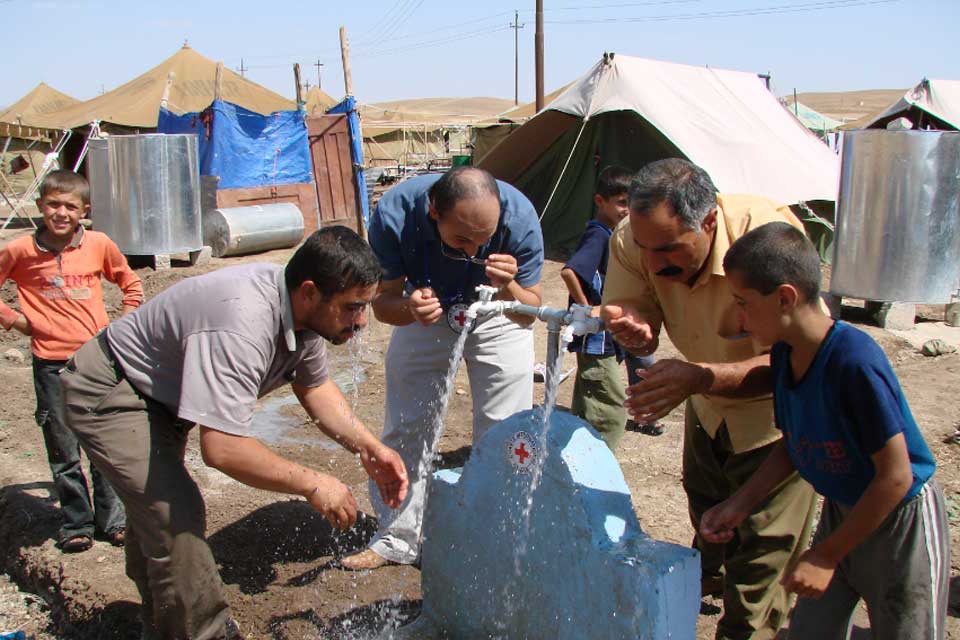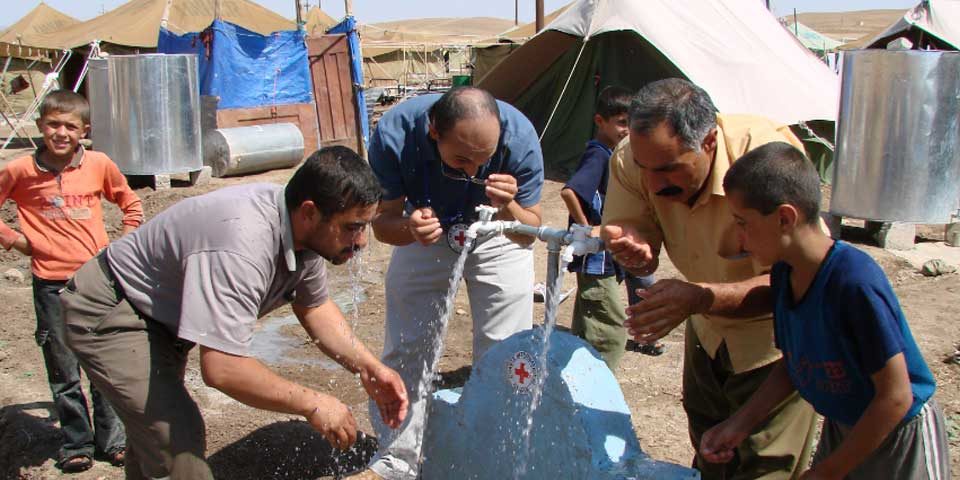Conflicts disrupt access to water, making civilians in affected areas acutely vulnerable to the risks posed by COVID-19.

Access to water is critical for civilians in conflict zones. Yet all too often, water infrastructure is damaged or deliberately targeted. In an effort to strengthen the norms intended to protect water supplies in conflicts, the Geneva Water Hub recently published the Geneva List of Principles on the Protection of Water Infrastructure. It contains a set of legal principles informed by international humanitarian, human rights and environmental law. In this blog, Mara Tignino and Tadesse Kebebew from the Geneva Water Hub argue that COVID-19 shows why these principles are more important than ever.
Highlighting vulnerabilities
‘To attack water is to attack an entire way of life.’ War and Water, ICRC, Geneva 1998, p.34
The COVID-19 pandemic has disrupted normal livelihoods around the world and hammered home the centrality of water and water infrastructure for human existence. In conflict-affected communities with already meagre access to water, the pandemic poses unfathomable dangers.
Even in the face of a global pandemic, water resources and water infrastructure in conflict-affected areas are still being used as a weapon, subjected to interruptions or even deliberate attacks. Civilians in north-east Syria have faced supply interruptions after Turkish-backed groups took control of a water pumping station that supplies 460,000 people. For Yemen, the damage wrought to its water, sanitation and health infrastructure has already created an ongoing cholera epidemic and left it ill-equipped to face COVID-19. And, just last month, it was reported that an armed group in Libya cut off the main water pipeline to more than two million people in and around Tripoli.
As the United Nations Special Rapporteur on the human rights to safe drinking water and sanitation fittingly stressed, access to safe drinking water and sanitation is central to living a life in dignity and upholding human rights. In particular, the World Health Organisation recommended that the provision of water, sanitation, and health services (WASH) is essential to protecting human health during all infectious disease outbreaks, including the COVID-19 pandemic.
Considering the unprecedented threat posed by COVID-19 to billions of the world’s poorest and most vulnerable people, with no access to safe water services, including for their hygiene (which is the principal measure to prevent contagion), UN experts warned that the pandemic ‘will not be stopped without providing safe water to people living in vulnerability’. At the same time, UNICEF has noted that a large proportion of the world’s population lack access to basic hand-washing facilities in their homes, which will negatively impact efforts to curb the spread of the pandemic. The International Committee of the Red Cross (ICRC) has also emphasised the significant role that water supply facilities play in enabling civilians in conflict areas to implement basic prevention measures, such as frequent hand-washing.
Armed conflict exacerbates vulnerability by displacing people, hindering access to health care and humanitarian aid, and destroying water infrastructure and health facilities. Reports on recent armed conflicts reveal that water has also increasingly been used as a means or method of warfare, and by both states and non-state actors, contrary to what international law stipulates. Noting the adverse consequences of armed conflicts on water resources and infrastructure, the Global High-Level Panel on Water and Peace underscored that ‘the protection of water resources and installations constitutes a vital element of the protection of civilians in armed conflicts, therefore water must not be affected by armed attack or used as a weapon of war.’
Likewise, the ICRC has underlined that COVID-19 is a particular threat in ‘places where health systems have been ravaged by war, where people uprooted by conflict live in close proximity, and where life-saving resources like clean water, soap and medicine are in short supply.’ The head of UN Peacekeeping, Jean-Pierre Lacroix similarly agrees that conflict-affected or post-conflict societies lack access to basic infrastructure or social and sanitary safety nets, disproportionately exposing them to the pandemic.
International response
Given the exposure of conflict zones to the pandemic, the UN Secretary-General has appealed to warring parties around the world to commit to a ‘global ceasefire’ to focus on ‘the true fight of our lives’, i.e. COVID-19. A call that has been partly heeded, including by armed groups. As documented by the UAB Escola de Cultura de Pau, there have been some positive responses to this global appeal, with some state and non-state actors willing to temporally cease fighting to facilitate humanitarian assistance to contain the spread of the virus.
Meanwhile, the UN General Assembly adopted a resolution on the 2nd of April calling for intensification of international cooperation to contain, mitigate and defeat the pandemic. The resolution reaffirmed its full commitment to the decade of action and delivery for sustainable development, which among other things includes improving access to clean water and sanitation (SDG 6). Similarly, confronted with the COVID-19 pandemic, many international humanitarian organisations, such as the ICRC, UNICEF, UNHCR and International Organisation for Migration, are ramping up assistance to prevent and contain the spread of the virus by establishing or enhancing water and sanitation services for vulnerable communities, mostly those displaced as a result of armed conflicts.
The Geneva Water Hub and the Geneva List of Principles on the Protection of Water Infrastructure
The GWH, a centre of the University of Geneva, was established to help prevent water conflicts at an early stage, and to promote water as an instrument of peace and cooperation. The Hub’s Platform for International Water Law builds on different initiatives. These had explored how attacks against water infrastructure, and its weaponisation, adversely affected the civilian population, health care facilities, WASH professionals and the environment.
The Geneva List of Principles on the Protection of Water Infrastructure (GLP) was developed from a recommendation from the Global High-Level Panel on Water and Peace in its 2017 report ‘A Matter of Survival’. It identified a need to strengthen respect for, and implementation of, international humanitarian law’s (IHL) provisions concerning water. The GLP was developed in collaboration with different actors, including a contribution from the Conflict and Environment Observatory.
For the first time the rules applicable to the protection of water infrastructure during armed conflicts, as well as pre- and post-conflict situations, have been systematised and formulated in a single document. The GLP takes a holistic approach, integrating rules and principles from different branches of international law, including IHL, human rights law, international environmental law and international water law. It also considers UN Security Council resolutions that have expressed grave alarm at attacks against civilian infrastructure, including deliberate interruptions of water supply. The GLP also includes rules and principles found in soft law documents, suggesting them as good practices.
The scope of the GLP covers the protection of water resources and infrastructure, the humanitarian personnel who work on them, and also highlights the connections between water, health care, the environment and post-conflict peacebuilding. Though as a document the GLP is not binding in itself, it principally restates the binding rules of international law on both states and non-state actors as parties to a conflict. As such, it is intended to serve as a reference document for parties to armed conflicts, for international organisations and for other practitioners.
Operationalising the GLP
With the GLP published, we are now starting out on three linked studies. These will examine: how the principles it identifies are operationalised in national legal frameworks; what mechanisms are in place to monitor the enforcement of the rules; and what accountability mechanisms, if any, have been used to address violations of them. All three align closely with the goals of the resolution Bringing IHL home: A road map for better national implementation of international humanitarian law, which was adopted at the 33rd International Conference of the Red Cross and Red Crescent last December.
This resolution serves as a reminder that, although efforts have been made by parties to protect civilians and civilian objects, armed conflicts still cause dire humanitarian consequences. It calls for more protection for the most vulnerable, in particular women, children and persons with disabilities, and to ensure that they receive timely and effective humanitarian assistance. It also calls for effective accountability mechanisms for those who commit serious violations of IHL.
Using this as a starting point, we have begun work on the first of the three themes, exploring how damage to, and the protection of, water and water-related infrastructure are taken into account in military decision-making processes during conflicts. To do so we are examining military manuals and case law.
The weaponisation of water, and the deliberate targeting of water infrastructure is contrary to international law, and right now civilian populations living without water are acutely and disproportionately vulnerable to COVID-19. The grave threat this pandemic is posing should remind us all of the critical importance of protecting water during armed conflicts.
Mara Tignino is Lead Legal Specialist, and Tadesse Kebebew a Researcher at the Geneva Water Hub.





